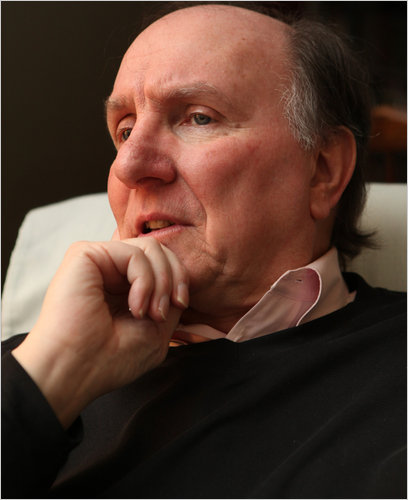A 2,500 word profile of Village Voice legend Wayne Barrett will appear in the Sunday print edition of the New York Times.
Wayne Barrett, whose column has appeared in the Village Voice since 1978, says that he and political reporter Tom Robbins are leaving the paper.
Thomas Van Flein issued a four-page letter on Saturday denying there was a brewing scandal behind Palin's decision to resign her gubernatorial office a day earlier. What's more, the statement put the media on notice that the Palin team would file defamation lawsuits against media outlets that repeated allegations about a possible scandal centered around a building contractor with close ties to the Palins. In a footnote, Van Flein points out these "insinuations" were published in the "left wing Village Voice" in an October 2008 story by Wayne Barrett. The piece examined links between Palin and several contractors who worked on a sports complex as part of a deeper look at Palin's previous record. "Van Flein's statement -- which derides 'modern journalism' for 'abhorring' due diligence and factchecking -- is actually longer than the section of the Voice story that examined the connections around the complex," Barrett writes, "but he does not challenge a single fact actually presented in our story."
Miami New Times' Isaiah Thompson was awarded a IRE certificate in the local circulation weeklies category for his stories on how residency restrictions forced sex offenders to live under a Miami bridge. In the same category, the AAN-commissioned "Who Killed Brad Will?" was a finalist, along with Peter Byrne's series on Sen. Dianne Feinstein in the North Bay Bohemian and Wayne Barrett's reporting on Rudy Giuliani in the Village Voice. The Texas Observer's reporting on sexual abuse at a state-run youth prison and the cover-up that followed it was also a finalist, in the Magazine/specialty publication category. The Chauncey Bailey Project, which the San Francisco Bay Guardian took part in, was awarded this year's Tom Renner Award, which honors "outstanding reporting covering organized crime or other criminal acts."
In response to last week's Voice cover story, which raised questions about whether the presidential candidate's four New York Yankees World Series rings were obtained in a legal and ethical manner, Giuliani told an Alabama crowd that Wayne Barrett "sticks pins in a doll of me every night" and "almost never gets his facts right." The story quoted appraisers who approximated the rings' value at $200,000, while Giuliani only paid $16,000 for them. More importantly, the article called into question the timing of the deals, alleging that he received them while still mayor -- a violation of law that could still be prosecuted. The Voice's allegations, which Giuliani says are "totally untrue," have sparked a new round of criticism of his administration, especially given his last-minute approval of a $400 million new stadium for the Yankees.
In its Sunday metro column "Reading New York," the New York Times plugs "Grand Illusion: The Untold Story of Rudy Giuliani and 9/11" (second item), co-authored by Village Voice veteran Wayne Barrett. Barrett teamed up with CBSNews.com Producer Dan Collins to take a hard look at the New York City mayor's performance before, during and after the terrorist attack. "Given all the hagiography that has been generated by the subject," writes Sam Roberts, “'Grand Illusion' is a welcome and overdue corrective, one that amplifies the gaps in preparedness, management and communications, and challenges the post-9/11 legend."
Hunter College in New York City has selected Wayne Barrett to receive the inaugural Jack Newfield Visiting Professorship in Journalism. Newfield was an investigative journalist at the Voice from 1964 to 1988; he died of cancer in 2004. On the school's Web site, Hunter President Jennifer J. Rabb said, "As Jack Newfield's colleague at the Voice and an investigative journalist in his own right, Wayne Barrett brings a unique insight to Hunter students. They will learn from one of New York's best reporters how journalists can continually rediscover, and tell the story, of the drama of a great city remaking itself again and again."
Newsday reports that Newfield -- who worked at the Village Voice from 1964 to 1988, first as a columnist and reporter, and later as senior editor -- died Monday night at the age of 66. After leaving the Voice, he went on to write for the New York Daily News and the New York Post, and was most recently a columnist at the New York Sun. He also authored 10 books, including biographies of Robert Kennedy and Rudy Giuliani. Wayne Barrett, Newfield's colleague at the Voice, tells Newsday: "I think [Newfield] invented a whole new form of personal investigative journalism that was rooted in a consuming ethic and a brilliant search for truth."


